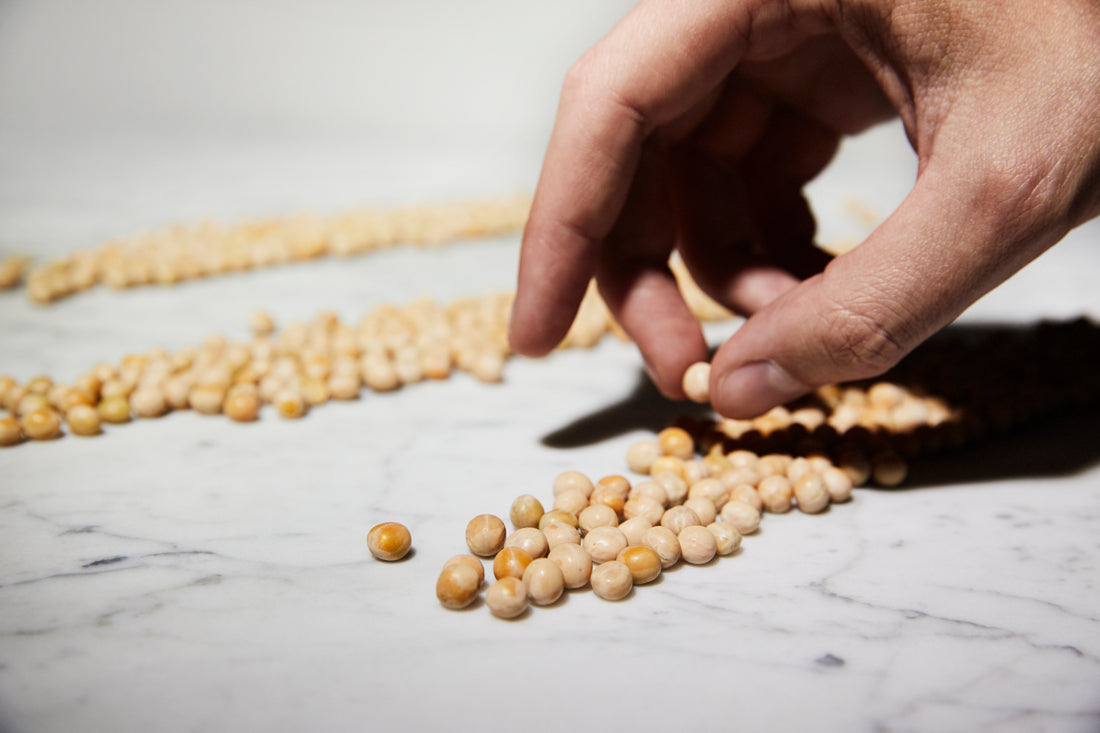PEA PROTEIN - 12 REASON WHY
Pea protein is often underestimated when it comes to working out and building muscles. A lot of people tend to think of plant-based proteins as incomplete protein sources. They’re not all wrong, some plant-based proteins are incomplete sources of protein. But pea protein is a full-worthy plant-based protein source. And here’s why!
We can start off looking at some amino acids. The body needs 9 different amino acids to stay alive and leucine is an amino acid especially related to muscle building. Pea protein contains about 9% leucine by weight, compared to whey protein which is about 10% leucine by weight. This proves that people can gain just as much muscle by using pea protein. Leucine is a vital amino acid since it helps to absorb calcium and helps strengthen our body in many ways. Pea protein is almost pure protein. Pea protein isolate is about 85% protein, 7% fat, 3% carbohydrate and 5% vitamins and minerals. The pea protein also digests slowly, which may improve your body composition over time. Research shows that slower-digesting proteins are better for muscle growth over the long term. Slower-digested proteins are also great for taking before bed time, like you do with casein.
To make it easy for you to read all the benefits of pea protein, we gathered a list of our top benefits:
1. Pea protein contains a lot of leucine!
Pea protein contains a lot of amino acids. Amino acids is vital for our bodies. There are about 9 amino acids that are must-haves for us. Leucine is one of these amino acids, and it’s essential for building connective tissue like skin, cartilage, and bones. Leucine does also help absorb calcium, which is a must for strong bones.
Legumes are one of the richest sources of leucine, so if your diet is heavy in grain or grain-based protein and low on beans and legumes, pea protein is the right way for you to go.
2. Allergic to whey and casein? No worries! Pea protein has none of that
The majority of protein powders you can find in your local grocery stores contain whey or casein. Although most of the lactose has been removed from whey, trace amounts still remain. If you, like a lot of other people are lactos-intolerant, these dairy-proteins will most likely have you sitting in the bathroom for the next hour.
Pea protein is free from soy, free from dairy, free from gluten and free from nuts, which means – you can basically be allergic to anything and still enjoy some pea protein!
3. Pea protein is gluten free
If you are allergic to gluten or following a gluten-free diet for whatever reasons, you are safe. Pea protein is not only gluten free, it is NATURALLY gluten free. How about that!
4. Pea protein is kind to your stomach
You might have heard that different beans and legumes give you gas and a bloated stomach. Pea protein comes from a legume, but the peas undergo a process to remove most of the fiber and starch content – which usually is the biggest reason for gas and bloating. It is also highly digestible – can you guess how high? It’s 94% (!!) digestibility! Wow.
5. High in plant-based iron
Iron is an essential mineral, which helps the body to transport oxygen through the blood. A lack of iron can lead to some serious consequences, which you easily prevent by eating iron-rich foods.
There are two types of iron, one found in animalistic meats and one found in plants. Pea protein is of course rich in the iron found in plants, non-heme iron.
6. Low glycemic index - longer but easier digestion
Pea protein having a low glycemic index means that it takes longer to digest. That being said – it still is easily digested. A longer digestion means that the blood sugar levels can be kept even. It also makes you feel full for a longer time and it can also help you to keep your body weight stable and maintain a healthy weight.
7. Pea protein is low-carb!
Legumes are usually high in complex carbs, but in pea protein most of the carbs have been removed, which makes pea protein a low-carb protein source.
8. BCAAs for your biceps
BCAAs are the amino-acids that the body cannot produce on its own. BCAAs help to gain and build muscles and also stimulate protein synthesis.
According to a study performed by US National Library of Medicine, participants who supplemented with pea protein increased bicep muscle thickness at the same rate as the participants using whey protein.
9. Pea protein + arginine = True
Arginine is also an amino acid which is good for both your heart and muscle growth. Pea protein actually contains more than 3 times the amount of arginine per gram than whey protein. Ain’t that something!
10. Pea protein is very low in FODMAP
FODMAP – fermentable, oligosaccharied, disaccharides, monosaccharides and polyols. Still following? Let me makes this understandable. FODMAP-foods contain certain carbs and sugar alcohols, which we really want to avoid if we have Irritable Bowel Syndrome. Pea protein is very low in FODMAP. Super-nerdy, right? Sorry about that. But hey, it’s still another benefit!
11. Pea protein contains mega-magnesium
Magnesium is one of our best friends. Magnesium is involved in more than 600 different chemical reactions in our body – including muscle movement. Studies have shown that it also helps with DNA repair and may also benefit heart and brain health.
Pea protein is a huge magnesium source that makes it easy to consume the recommended daily intake using a little help from our friend – the pea.
12. Pea protein is saturated fat free and cholesterol free
Saturated fats are bad for the heart since they raise cholesterol levels in the blood. An easy way of reducing your intake of saturated fats and cholesterol is to cut down on the animal products and proteins, since these are only found in animal proteins.
Whatever your goal is switching to pea protein has a lot of benefits. It’s a good and complete protein source that has a great impact on your body and overall health. Apart from the health benefits, it is also the best alternative for environmental reasons. But we’ll talk more about that later on. For now – run to your closest store to buy some pea protein! Or have a nice little walk to your refrigerator to grab your Sproud and have yourself a glass of that protein-rich pea-goodness.


